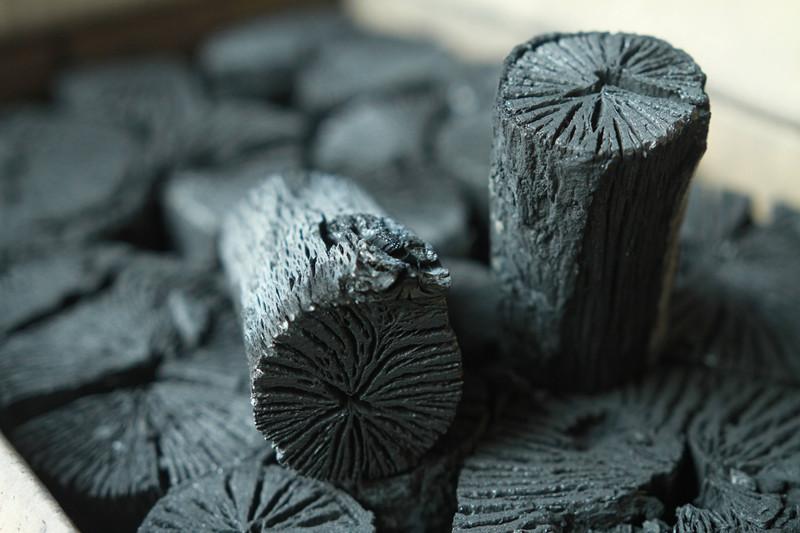So with all this carbon constantly being depleted from the atmosphere, we really need to keep carbon output up to a certain point.
所以,由于碳會(huì)被不斷地從大氣中耗盡,我們真的需要將碳輸出量提高到一個(gè)特定水平。
So why all the bad press for burning carbon?
那么為什么燒碳有這么多不好的名聲呢?
Well, turns out it's the source of the carbon being burned that's the key.
原來(lái)關(guān)鍵在于碳燃燒的來(lái)源。
It's in fact the burning of what we call "fossil carbon" that creates the imbalance.
事實(shí)上,燃燒"化石碳"才會(huì)產(chǎn)生這種不平衡。
Fossil fuels, coal, oil, natural gas, these substances are all mined, we have to dig them up or drill a well to release them.
化石燃料、煤、石油、天然氣,這些物質(zhì)全都埋在地底下,我們必須把它們挖起來(lái)或鉆個(gè)井把它們釋放出來(lái)。

And this is carbon that was in the atmosphere millions of years ago.
而這是幾百萬(wàn)年前存在于大氣中的碳。
So what happens is: when we burn this carbon, OK, it doesn't really release a whole lot compared to the amount that's already there in the atmosphere, but it adds to the pool.
所以會(huì)發(fā)生的事是:當(dāng)我們燒這種碳時(shí),與已經(jīng)存在于大氣中的相比,它真正釋放出的并沒(méi)有那么多,但它增加了大氣中的含量。
And over years it accumulates, think of the atmosphere as a big bathtub.
經(jīng)過(guò)數(shù)年它會(huì)累積,可以把大氣層想成一個(gè)大浴缸。
It's basically already filled to the brim with carbon, when we start adding fossil carbon into the mix, it starts to spill over.
它基本上已經(jīng)加滿了碳,當(dāng)我們開(kāi)始往里面添加化石碳時(shí),它就開(kāi)始外溢了。
That being said, there's actually a category that's in-between: what we call biomass fuels, probably the most common one is wood.
話雖這么說(shuō),實(shí)際上還有一類(lèi)中間的:我們稱(chēng)它為生物燃料,最常見(jiàn)的一種可能就是木頭了。
Another example, um, on the North American plains, the Native Americans used to collect buffalo droppings to burn.
再舉個(gè)例子,在北美平原上,美洲土著以前會(huì)撿拾牛糞用來(lái)燒。
Uh, in Ireland, they cut up peat from bogs and they burn that.
在愛(ài)爾蘭,他們會(huì)切碎從泥塘中撈來(lái)的泥煤,然后燒這個(gè)。
So what's the big distinction between this and fossil carbon?
那么這個(gè)和化石碳之間的大區(qū)別是什么呢?
Biomass carbon is what we might call current carbon.
我們也許會(huì)把生物碳叫做活性炭。
It's always going in and out the atmosphere, so if we burn one of these fuels, we're putting its carbon into the atmosphere. Right?
它一直進(jìn)出于大氣層,所以如果我們燒了這種燃料中的一個(gè),我們是在把它的碳放進(jìn)大氣中,對(duì)吧?
But in a balanced system, somewhere else in the world the same amount of carbon is going back.
但在平衡機(jī)制下,同樣數(shù)量的碳會(huì)回到世界上其他地方。
It gets taken in by growing vegetation, so burning biomass fuel produces sort of not-so-bad carbon.
它會(huì)被生長(zhǎng)中的植被吸收,所以燒生物燃料會(huì)產(chǎn)生不那么壞的碳。
In fact, it can become good carbon if we endeavor as a society, as humanity, to allow forests to recover this carbon, if we don't, say, pave over all the surfaces to prevent things from growing.
事實(shí)上,如果我們作為一個(gè)社會(huì)、作為人類(lèi)努力起來(lái),讓森林恢復(fù)這種碳,如果我們不鏟平所有的地面,阻止植物生長(zhǎng)的話,它會(huì)成為好碳。
So whenever we cut down a tree and burn its wood, we have to allow another tree to grow to keep things in balance.
所以無(wú)論何時(shí)我們砍掉一棵樹(shù),燒它的木頭時(shí),我們必須讓另一棵樹(shù)生長(zhǎng)以保持平衡。
That way, you're carbon neutral.
這樣你就能做到碳平衡了。










